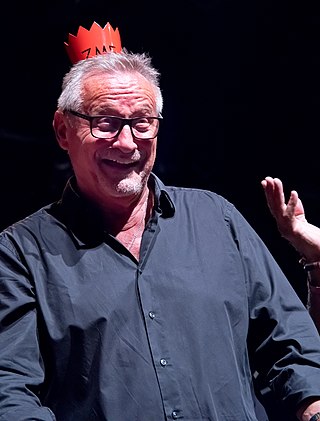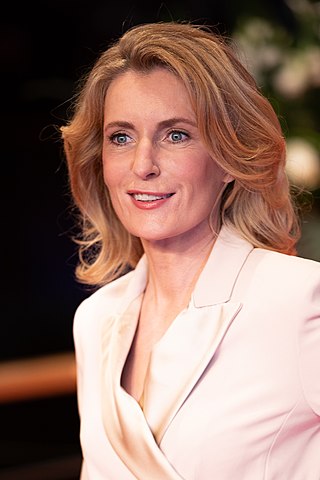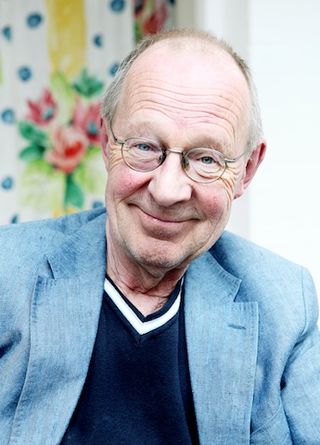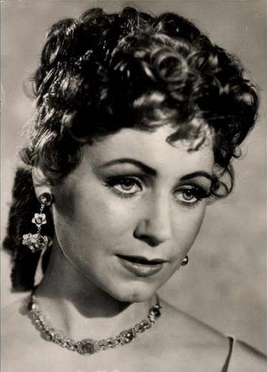Related Research Articles

Konstantin Alexander Wecker is a German Liedermacher (singer-songwriter) who also works as a composer, author and actor.

Götz George was a German actor, the son of actor couple Berta Drews and Heinrich George. His arguably best-known role is that of Duisburg detective Horst Schimanski in the TV crime series Tatort.

Maria Furtwängler-Burda is a German physician and television actress.

Peter Fleischmann was a German film director, screenwriter and producer. He worked also as an actor, cutter, sound engineer, interviewer and speaker. Fleischmann belonged to the New German Cinema of the 1960s and 1970s. He is known for directing the 1969 Jagdszenen aus Niederbayern, but he produced films of many genres.

Nadja Tiller was an Austrian actress in film, television, and on stage. She was one of the most popular German-speaking actresses in the international cinema of the 1950s and 1960s, receiving international recognition when she played the title role in the 1958 film Das Mädchen Rosemarie (Rosemary) in 1958, shown at the Venice Film Festival. It opened the way to international films. She often played alongside her husband, Walter Giller.

Volker Lechtenbrink was a German actor on stage, in film and television, a singer-songwriter, dubbing artist, stage director and theatre manager. He played in the anti-war movie The Bridge in 1959 at age 14. He appeared in popular television series including Der Kommissar, Der Alte and Tatort. Lechtenbrink was stage director at the Ernst Deutsch Theater in Hamburg, and intendant of the Bad Hersfelder Festspiele.
Lena Stolze is a German television and film actress.

Helen Schneider is an American singer and actress working mainly in Germany.
Klaus Schwarzkopf was a German actor. From 1971 until 1978 he starred in the Norddeutscher Rundfunk version of the popular television crime series Tatort. He was also known as a respected stage actor and for being the German dubbing voice of Peter Falk as Columbo during the 1970s.
Rosalie Helga Lina Zech, known as Rosel Zech, was a German theater and film actress, she is most well known for her works associated with the "Autorenkino" movement, which began in the 1970s.
The Hamburg Syndrome is a 1979 West German-French science fiction film directed by Peter Fleischmann and starring Helmut Griem, Fernando Arrabal and Carline Seiser. The film is about an outbreak of an epidemic and quarantine. The film received attention again in 2020 during the COVID-19 pandemic.

Hans Peter Korff is a German actor.

Karin Hübner was a German stage, film, and television actress. She appeared in more than forty films from 1955 to 1977. Her name is sometimes given as Karin Huebner.

Annett Renneberg (born 16 March 1978 in Rudolstadt) is a German actress and singer.

Angela Roy is a German actress and director.

Anne Zohra Berrached is a German film director and screenwriter.
Maja Schöne is a German actress. She is best known for portraying Hannah Kahnwald in the Netflix TV show Dark.
Dinah Eleonora Hinz, married name Hinz-Weiss was a German film and stage actress and audiobook narrator.
Anna Herrmann is a German actress.
Lutz Büscher was a German film director and screenwriter who helped create episodes for Großstadtrevier, Peter Strohm, and Titanic - Nachspiel einer Katastrophe, as well as his own series, Tatort.
References
- ↑ "Biography of Carline Seiser". Saatchi Art.
- 1 2 "Carline Seiser". filmportal.de (in German). Retrieved 20 September 2021.
- ↑ "Das Mädchen am Klavier – Tatort". Erstes Deutsches Fernsehen (ARD) (in German). 20 December 2011. Retrieved 18 September 2021.
- ↑ "Lauter anständige Menschen". Willkommen im Deutschen Filmhaus (in German). Retrieved 18 September 2021.
- ↑ Hippen, Wilfried (18 April 2020). "Der Film zur Epidemie" [The film about the epidemic]. Die Tageszeitung (in German). pp. 54 ePaper 43 Nord. Retrieved 19 August 2021.
- ↑ Blumenberg, Hans C. (7 December 1979). "Filmtips: Die Hamburger Krankheit". Die Zeit (in German). Archived from the original on 26 September 2016. Retrieved 20 August 2021.
Die Hamburger Krankheit von Peter Fleischmann ist ein chaotischer Film über chaotische Zustände, erheblich reizvoller, ungewöhnlicher und intelligenter als es die vielen Verrisse vermuten lassen. ... So exzentrisch wie das Personal dieser apokalyptischen Farce zwischen Reeperbahn und Almhütte ist auch Fleischmanns Inszenierung: eine Folge von gewaltsamsten Stilbrüchen, ohne Rücksichten auf ästhetische Verluste.
- ↑ Karasek, Hellmuth (23 September 1979). "Unheilbar" [Incurable]. Der Spiegel (in German). Archived from the original on 30 July 2021. Retrieved 20 August 2021.
An Randfiguren sieht man, daß Fleischmann der gelackten und geschönten neudeutschen Wirklichkeit eine Art Bunuel-Welt der Kranken, Maroden, Ausgestoßenen entgegensetzen wollte.
- ↑ "Film: Die Hamburger Krankheit". Deutsche Filmbewertung und Medienbewertung FBW (in German). Retrieved 21 August 2021.
- ↑ "Die Hamburger Krankheit". Filmfest Hamburg 2019. Retrieved 19 August 2021.
- ↑ "Die Hamburger Krankheit" [The Hamburg Syndrome]. Cinema (in German).
- ↑ "Konstantin Wecker Biography" (in German). Konstantin Wecker's official website.
- ↑ "CARLINE SEISER". VISIONARY ART GALLERY. Retrieved 18 September 2021.